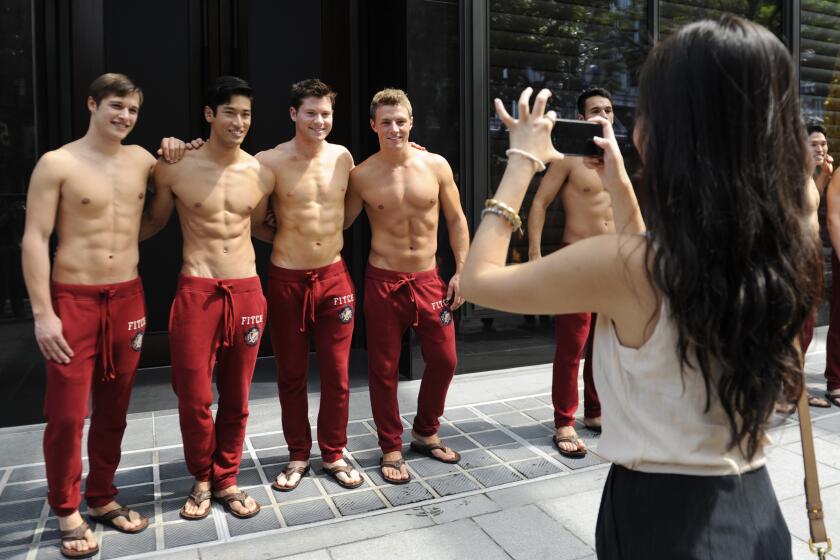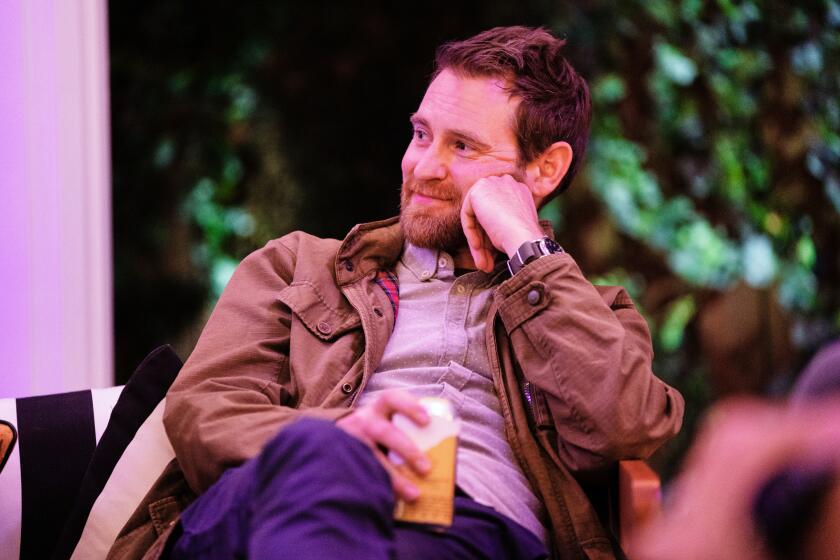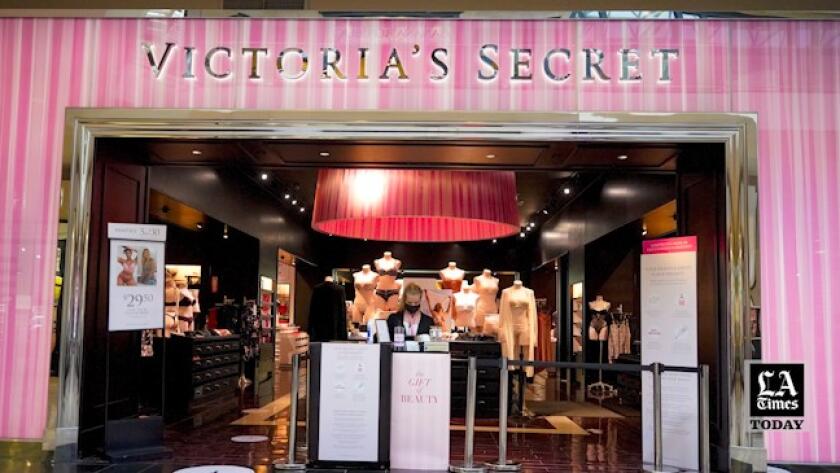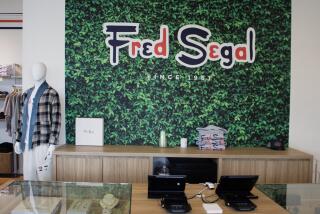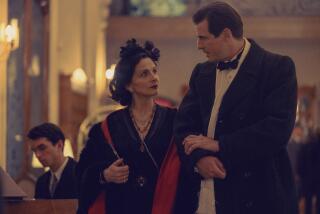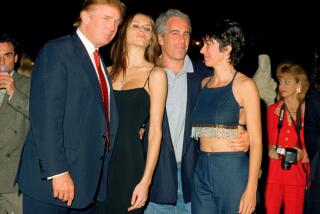To grasp the ‘dramatic collapse’ of Victoria’s Secret, a new doc looks to Jeffrey Epstein
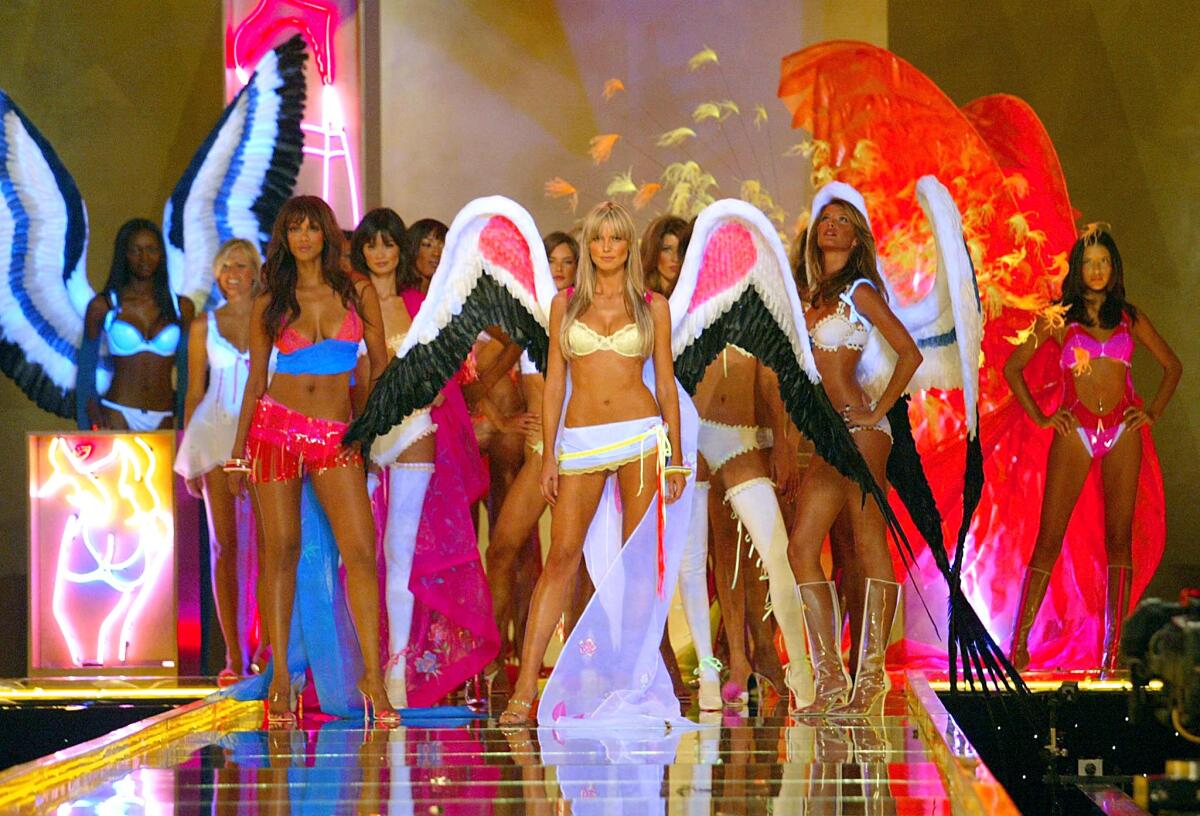
- Share via
Leslie Wexner was once known as the Merlin of the Mall for his seemingly magical ability to create ubiquitous retail brands: the Limited, Express, Bath and Body Works, Abercrombie & Fitch.
Perhaps his greatest success was Victoria’s Secret, the fledgling lingerie company he transformed into a billion-dollar behemoth that dominated the intimate apparel market for decades. But, as detailed in the new docuseries “Victoria’s Secret: Angels and Demons,” the company imploded spectacularly following a series of publicity disasters, internal scandals and revelations about Wexner’s ties to notorious predator Jeffrey Epstein in 2018 and 2019.
“It was one of the most dramatic collapses of a fashion empire in recent memory,” says director Matt Tyrnauer, whose previous films include “Valentino: The Last Emperor” and “Where’s My Roy Cohn?”
The Hulu series, premiering Thursday, charts the rise and fall of the brand and the self-made Midwestern billionaire behind it, who started with a single store in a Columbus, Ohio, suburb and eventually grew wealthy enough to build his own town. Featuring interviews with journalists, models and former Victoria’s Secret executives (though not Wexner, who stepped down from his role as chief executive in 2020), “Angels and Demons” portrays a corporate culture that was infected with the same misogyny it peddled to the masses.
We learn how Wexner acquired Victoria’s Secret in 1982 and revamped the brand with a refined yet accessible sensibility based on a fictional Englishwoman named Victoria. By the late ‘90s, guided by Wexner and marketing chief Edward Razek, the company had embraced a more overtly sexy image: In the company’s televised fashion show, supermodels like Heidi Klum and Gisele Bündchen strutted down runways in enormous angel wings and barely-there underwear.
Netflix’s new documentary ‘White Hot: The Rise and Fall of Abercrombie & Fitch’ considers darker side of the onetime mainstay of mall culture.
Most damning of all is Wexner’s close association with Epstein, who was arrested on federal sex trafficking charges in 2019 and killed himself while awaiting trial. As far back as 1993, Epstein, who served as Wexner’s money manager for more than a decade during the heyday of Victoria’s Secret, was rumored to pose as a talent scout for the company and was accused of assaulting a model during a so-called audition for the catalog in 1997. Another woman claims she was assaulted by Epstein at Wexner’s Ohio estate in 1996. (Wexner said he cut ties with Epstein in 2007.)
“Angels and Demons” — which follows a Netflix documentary about sister company Abercrombie & Fitch, a podcast about Victoria’s Secret released last year and a cottage industry of Epstein journalism — examines some of the most prevalent theories about the convicted sex offender and the origins of his wealth, including the suggestions that Epstein was running a massive blackmail scheme or working in intelligence.
And while it doesn’t conclusively answer the most pressing question about Wexner — just why did he associate with Epstein for so long? — it is nevertheless a fascinating portrait of a business visionary with a catastrophic blindspot. (In 2019, Wexner claimed Epstein misappropriated “vast sums” of his money.)
Tyrnauer spoke with The Times about the series, what Wexner has in common with contemporary tech billionaires and the “fever swamp” of Epstein conspiracy theories.
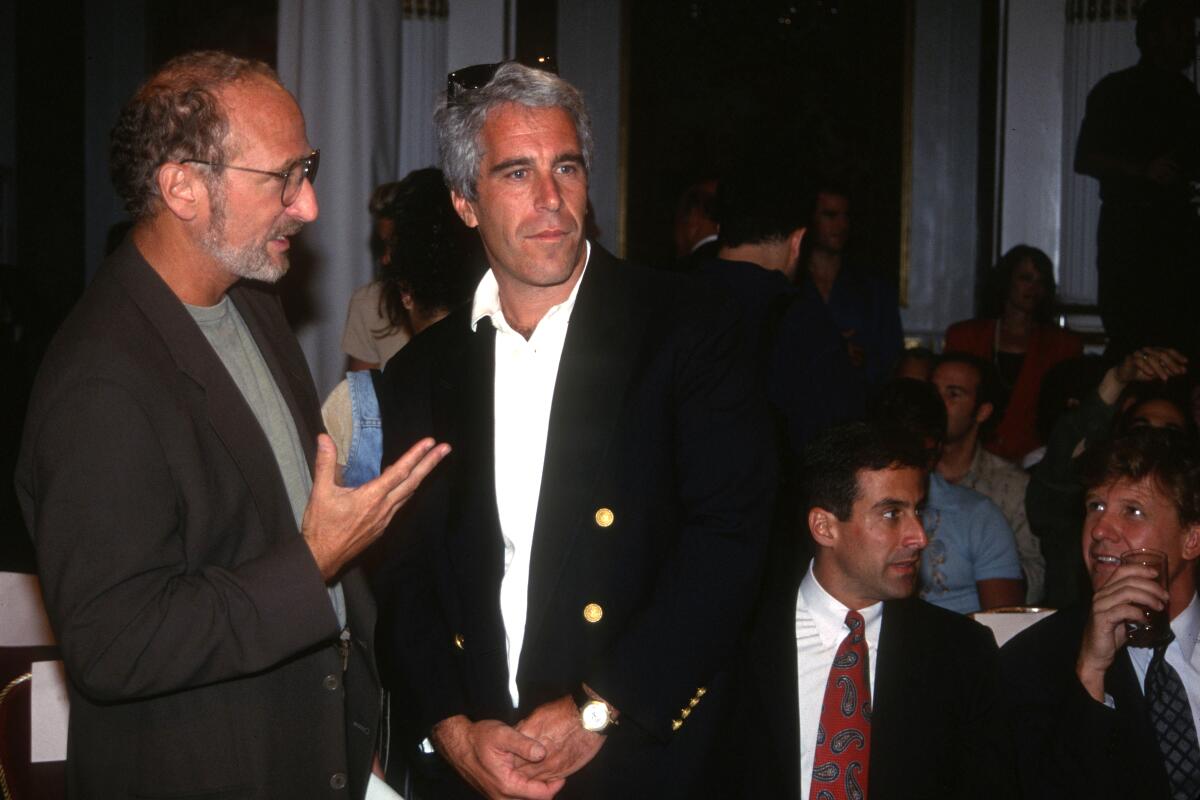
What drew you to Les Wexner and Victoria’s Secret?
I like to make projects about closed systems and worlds apart. And this certainly fell into that category. My first film was about Valentino, which was the opposite end of the spectrum — the world of haute couture. This one is about the most mass of mass market and, in our current time, the culturally much more impactful, because the story of fashion has become one of the mass market. L Brands, the [former] parent company of Victoria’s Secret, virtually invented fast fashion. I started to explore this topic when certain famous models who had been associated with the brand began to rebel against it on social media. The company then had a near-death experience after I was already looking into the story and by then already seemed like a behemoth losing its grip.
Did you find the former Victoria’s Secret models were reluctant to speak?
Frederique van der Wal, who was one of the original major models associated with the brand, gave us a really insightful interview and was very articulate about her experience. Younger models also spoke. But a lot of the major names associated with the brand at its apex didn’t speak, and I’m not sure why they weren’t willing to do so.
‘It’s probably easier ... to leave out that dark story and just not touch on it,’ Roberts told The Times, ‘in the service of the great forgetting.’
Van der Wal says she felt very exposed after days when she worked for Victoria’s Secret. I thought that was striking. We think models are inured to that sort of thing.
When she was doing work for the brand, it was early days. Lingerie as fashion really wasn’t a thing before Victoria’s Secret, and I would venture to say that lingerie as fashion was barely ever a thing. I don’t really consider Victoria’s Secret to be a fashion brand. I consider it to be a marketing scheme that sold relatively inexpensive lingerie to the mass market and did so incredibly effectively using the tropes and trappings of the fashion world to achieve their goal.
What did Wexner understand correctly about consumers, especially when it came to Victoria’s Secret? What do you think he correctly intuited back in the ‘80s when he acquired the company?
I see Wexner as the [Amazon’s Jeff] Bezos and [Meta’s Mark] Zuckerberg of his time. He was one of the great merchants, certainly, but he was the analog version of the tech and social media titans we all obsess over. As I was making this, I really saw the 1.0 version of Instagram in the shopping mall. The mall was the fantasy machine of its time.
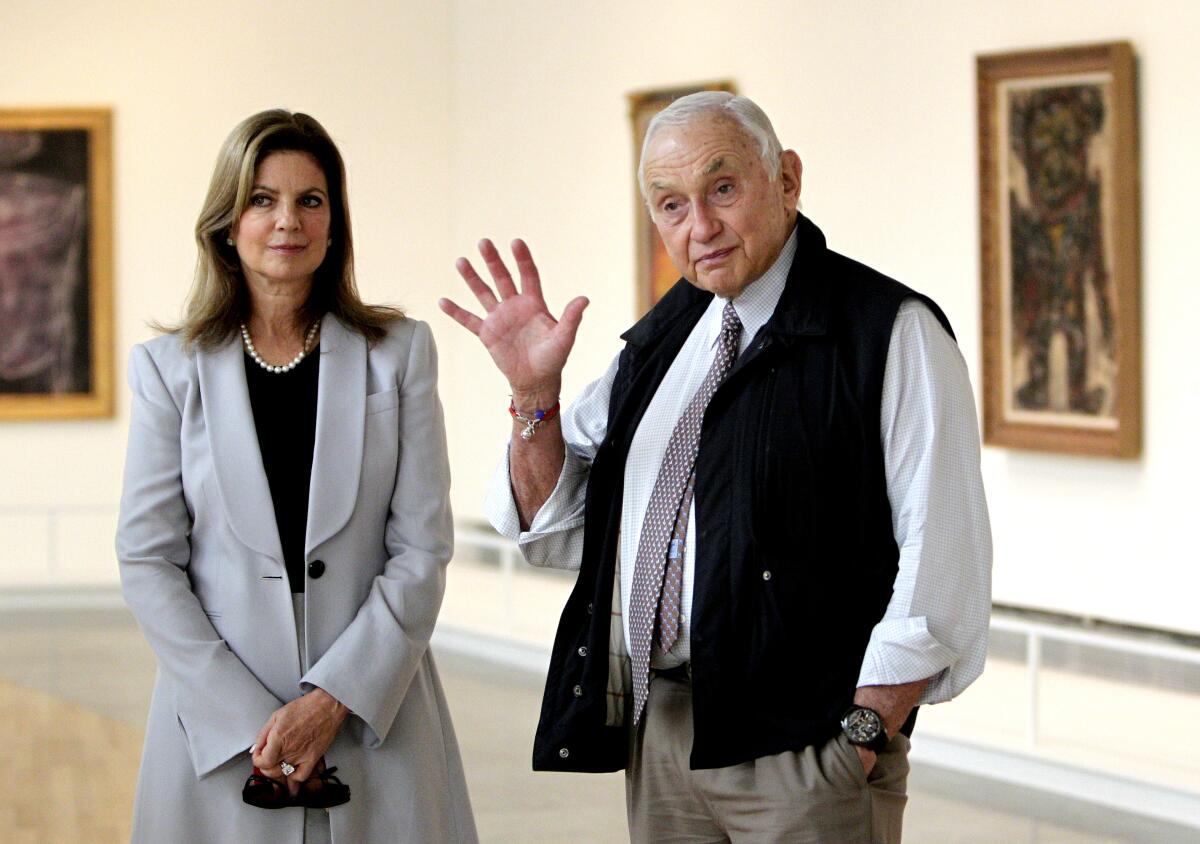
Do you think Victoria’s Secret would have floundered as a brand even if the ties between Epstein and Wexner never came to light? How much of the brand’s troubles are tied to that relationship?
I think the brand ran out of road years ago. Why it kept going is a mystery to me. The angels on the runway and all of that exploitative use of female sexuality to sell things was incredibly dated. When I started the project, I might have been the last person in the Western Hemisphere that didn’t know about the angels. I was like, “God, this seems like something from Las Vegas in the ‘60s at the Stardust.”
You see [in the series] there was a lot of internal strife at the company. The crew that had done the original successful branding of Victoria’s Secret as an upscale aristocratic world rebelled and either quit or were fired in the early aughts when [the company] changed tack. The relevance of the brand I think really stopped probably several years before its near-death experience [in 2018-2019].
What do you think motivated Wexner? He is a cipher.
Wexner himself has said that he created a fantasy world and he lived in it. He builds his own town, outside of Columbus, where the company is based, called New Albany, which is a fantasy world of Georgian splendor that has nothing to do with the farmland on which it was built. It’s the particular fantasy of one billionaire and has notes of Gatsby and Ralph Lauren.I think it was a forerunner to billionaires going to outer space and trying to colonize Mars.
The complete guide to home viewing
Get Screen Gab for everything about the TV shows and streaming movies everyone’s talking about.
You may occasionally receive promotional content from the Los Angeles Times.
How did you approach the Epstein side of this story? Because I feel like you could spend the rest of your life going down Epstein rabbit holes.
Epstein is one of the greatest con men of the last 100 years in this country. I would say the other two were Roy Cohn and Donald Trump. Epstein’s Zelig-like ability to attach himself to wealthy targets in that New York money-fashion-industrial complex is chilling.
Reporter Sarah Ellison says that, according to the best estimates, Wexner paid Epstein around $400 million over the course of their business relationship. Do you have any sense of why Wexner apparently considered Epstein so valuable?
That remains a big question mark. And we may never know. Despite the efforts of many great journalists looking into this, including Sarah Ellison, who’s in the film, and writers from Vanity Fair and the New York Times, it really remains a mystery.
One of the sex-trafficking experts in the series states rather conclusively that Epstein was using women and girls as tools to blackmail powerful men. Are you convinced of this theory?
It’s very hard to say. The Epstein narrative is now obscured by the weeds of the fever swamp. There are so many conspiracy theories around him and so many unanswered questions. It’s rather disorienting and hard to parse reality from conspiracy, and the facts are scarce because he didn’t live to go to trial.
‘Victoria's Secret: Angels and Demons’
Where: Hulu
When: Any time, starting Thursday
- Share via
Watch L.A. Times Today at 7 p.m. on Spectrum News 1 on Channel 1 or live stream on the Spectrum News App. Palos Verdes Peninsula and Orange County viewers can watch on Cox Systems on channel 99.
More to Read
The complete guide to home viewing
Get Screen Gab for everything about the TV shows and streaming movies everyone’s talking about.
You may occasionally receive promotional content from the Los Angeles Times.
